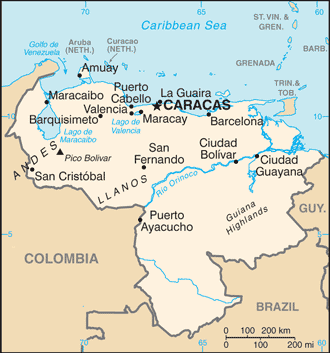 Venezuelan President Nicolas Maduro on Aug. 21 indefinitely closed a busy border crossing with Colombia and declared a 60-day state of emergency in several nearby towns after three soldiers were shot and wounded in an apparent clash with smugglers. Authorities said two assailants on a motorcycle fired on a patrol in the border town of San Antonio del Táchira, wounding a civilian as well as the two army lieutenants and a captain. Maduro has mobilized some 15,000 troops the area, and says the Simon Bolívar International Bridge, over the Río Táchira that forms the border, will remain closed until the assailants are apprehended. Colombian President Juan Manuel Santos has protested the border closure, signaling another flare-up between the uneasy South American neighbors.
Venezuelan President Nicolas Maduro on Aug. 21 indefinitely closed a busy border crossing with Colombia and declared a 60-day state of emergency in several nearby towns after three soldiers were shot and wounded in an apparent clash with smugglers. Authorities said two assailants on a motorcycle fired on a patrol in the border town of San Antonio del Táchira, wounding a civilian as well as the two army lieutenants and a captain. Maduro has mobilized some 15,000 troops the area, and says the Simon Bolívar International Bridge, over the Río Táchira that forms the border, will remain closed until the assailants are apprehended. Colombian President Juan Manuel Santos has protested the border closure, signaling another flare-up between the uneasy South American neighbors.
Maduro is blaming the attack on right-wing paramilitaries that operate in the area. "It's outrageous… everyone should show solidarity with the armed forces; the military personnel who are at the border to defend the homeland, he said in a TV broadcast. "Enough of paramilitary terrorism! It's time for justice for Táchira." Colombian paramilitaries are believed to be infiltrating into the Venezuelan border state of Táchira, and collaborating with conservative ranchers there who oppose Venezuela's populist government. Just days before the shooting incident, Maduro made new charges that prominent figures in Venezuela's right-wing opposition are in league with Colombia's hardline ex-president Alvaro Uribe in a plot to assassinate officials.
There's no doubt that the border is a key conduit for Colombia's cocaine enterprises. Indeed, just one year ago, Venezuela temporarily closed the border in a smuggling crackdown—an unprecedented move, despite numerous threats in the past. And there is also plenty of evidence of paramilitary activity in the area. In May, Venezuelan troops found the deteriorating remains of six men and one woman in a mass grave in Táchira state, just four kilometers from the border with Colombia. (Bogotá, in turn, accuses Venezuela of opening its territory to Colombian leftist guerillas.)
But some press accounts have portrayed the Aug. 20 shooting incident as a "riot." And it's also true that smugglers are moving as much (or more) contraband food and petrol across the border as cocaine: Venezuela's price and currency controls make smuggling goods into Colombia for resale at a huge profit an irresistible lure. Colombia and Venezuela have for years gone to the brink of war and then retreated at the last moment—realizing that both nations depend on an open border to get their goods (legal and not) to market. (AFP, Aug. 23; AFP, BBC News, Aug. 22; TeleSUR, IBT, Aug. 20; TelseSUR, Aug. 18; BBC News, May 5)
Cross-post to High Times
Graphic: Perry-Castañeda Library Map Collection







Recent comments
4 weeks 1 day ago
4 weeks 2 days ago
7 weeks 2 days ago
8 weeks 2 days ago
12 weeks 2 days ago
16 weeks 18 hours ago
20 weeks 23 hours ago
20 weeks 6 days ago
30 weeks 6 days ago
34 weeks 6 days ago